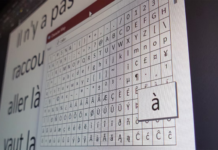Here we can see, “Microsoft Word Keyboard Shortcuts for Windows”
With these helpful keyboard shortcuts for Windows, you’ll be able to get the most out of Microsoft Word.
Microsoft Word is without a doubt one of the most powerful word processors available. Microsoft Word can handle any writing, whether it’s a letter, a storey, an essay, or something completely different.
It would help if you mastered Word’s keyboard shortcuts to become a Word Expert. They can assist you in navigating the Ribbon quickly, applying text formatting, justifying lines and paragraphs, and much more.
Using keyboard shortcuts can save you time by removing the need to fiddle with your mouse and divert your attention away from the critical task of writing. That’s why we’ve compiled this list of essential Windows shortcuts for Word.
Microsoft Word Keyboard Shortcuts for Windows
| Shortcut | Action |
|---|---|
| General | |
| Ctrl + N | Create a new document |
| Ctrl + O | Open a document |
| Ctrl + S | Save the document |
| Ctrl + P | Print the document |
| Ctrl + W | Close the document |
| Ctrl + Z | Undo |
| Ctrl + Y | Redo |
| Esc | Cancel |
| Ribbon | |
| Alt + F | Open the File page |
| Alt + H | Switch to the Home tab |
| Alt + N | Switch to the Insert tab |
| Alt + G | Switch to the Design tab |
| Alt + P | Switch to the Layout tab |
| Alt + S | Switch to the References tab |
| Alt + M | Switch to the Mailings tab |
| Alt + R | Switch to the Review tab |
| Alt + W | Switch to the View tab |
| Alt + Q | Search the Ribbon |
| Navigation | |
| Ctrl + F | Open the Navigation pane to search |
| Ctrl + G | Open the Go To window to navigate to an element |
| Home | Move the cursor to the start of the line |
| End | Move the cursor to the end of the line |
| Ctrl + Left arrow | Move the cursor left by one word |
| Ctrl + Right arrow | Move the cursor right by one word |
| Ctrl + Up arrow | Move the cursor up by one paragraph |
| Ctrl + Down arrow | Move the cursor down by one paragraph |
| Ctrl + Alt + Page up | Move the cursor to the top of the screen |
| Ctrl + Alt + Page down | Move the cursor to the bottom of the screen |
| Page up | Scroll up a page |
| Page down | Scroll down a page |
| Ctrl + Home | Move the cursor to the start of the document |
| Ctrl + End | Move the cursor to the end of the document |
| Shift + F5 | Move the cursor to the last change |
| Ctrl + Alt + Z | Cycle through the last four changes |
| Select Text | |
| Ctrl + A | Select all |
| Shift + Arrow keys | Select text in the specified direction |
| Ctrl + Shift + Left arrow | Select the left word |
| Ctrl + Shift + Right arrow | Select the right word |
| Shift + Home | Select to the start of the line |
| Shift + End | Select to the end of the line |
| Ctrl + Shift + Up arrow | Select to the start of the paragraph |
| Ctrl + Shift + Down arrow | Select to the end of the paragraph |
| Shift + Page up | Select to the top of the screen |
| Shift + Page down | Select to the bottom of the screen |
| Ctrl + Shift + Home | Select to the start of the document |
| Ctrl + Shift + End | Select to the end of the document |
| Edit Text | |
| Ctrl + H | Open the Replace window to find and replace |
| Ctrl + X | Cut the selected content |
| Ctrl + C | Copy the selected content |
| Ctrl + V | Paste from the clipboard |
| Ctrl + Shift + C | Copy the selected formatting |
| Ctrl + Shift + V | Paste the selected formatting |
| Alt + Shift + R | Copy the header/footer from the previous section |
| Ctrl + Backspace | Delete the word on the left |
| Ctrl + Delete | Delete the word on the right |
| Format Paragraphs | |
| Ctrl + J | Justify paragraph |
| Ctrl + E | Center paragraph |
| Ctrl + L | Align paragraph left |
| Ctrl + R | Align paragraph right |
| Ctrl + M | Indent paragraph |
| Ctrl + Shift + M | Remove paragraph indent |
| Ctrl + 1 | Apply single spacing |
| Ctrl + 2 | Apply double spacing |
| Ctrl + 0 | Add or remove a space before the paragraph |
| Ctrl + Shift + N | Apply the Normal style |
| Ctrl + Alt + 1 / 2 / 3 | Apply the Heading 1 / 2 / 3 style |
| Ctrl + Q | Remove paragraph formatting |
| Format Text | |
| Ctrl + D | Open the Font window |
| Ctrl + B | Apply bold |
| Ctrl + I | Apply italic |
| Ctrl + U | Apply underline |
| Ctrl + Shift + W | Apply underline to words, not spaces |
| Ctrl + Shift + D | Apply double underline |
| Ctrl + Shift + A | Format text upper case |
| Ctrl + Shift + K | Format text small caps |
| Ctrl + Shift + > | Increase font size |
| Ctrl + Shift + < | Decrease font size |
| Tables | |
| Up arrow | Move up a row |
| Down arrow | Move down a row |
| Alt + Home | Move to the row’s first cell |
| Alt + End | Move to the row’s last cell |
| Tab | Move to the row’s next cell |
| Shift + Tab | Move to the row’s previous cell |
| Alt + Page up | Move to the column’s first cell |
| Alt + Page down | Move to the column’s last cell |
Conclusion
I hope you found this information helpful. Please fill out the form below if you have any questions or comments.
User Questions:
- Is Microsoft Word free on Windows?
Microsoft Office is available for free in a web browser on any Windows 10 PC, Mac, or Chromebook. You can use your browser to open and create Word, Excel, and PowerPoint documents. Go to Office.com and sign up for a free Microsoft account to access these free web apps.
- Does Microsoft Word come with Windows 10?
Microsoft Office online versions of OneNote, Word, Excel and PowerPoint are included in Windows 10. In addition, online programmes frequently have their apps available for Android and Apple smartphones and tablets.
- Do computers come with Microsoft Word?
Microsoft Office is not usually included with computers. Instead, “Home and Student” and “Professional” are the most common versions of Microsoft Office. Microsoft shipped some computers with “Office Starter” – a free Word and Excel (with ads) – briefly, but this was short-lived.
- [Windows] Keyboard shortcuts that I find very Useful.
[Windows] Keyboard shortcuts that I find very Useful. from keyboardshortcuts
- Microsoft Word keyboard shortcuts



